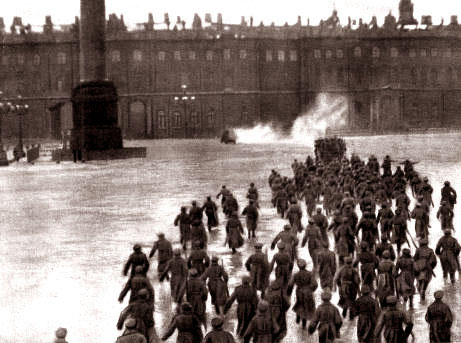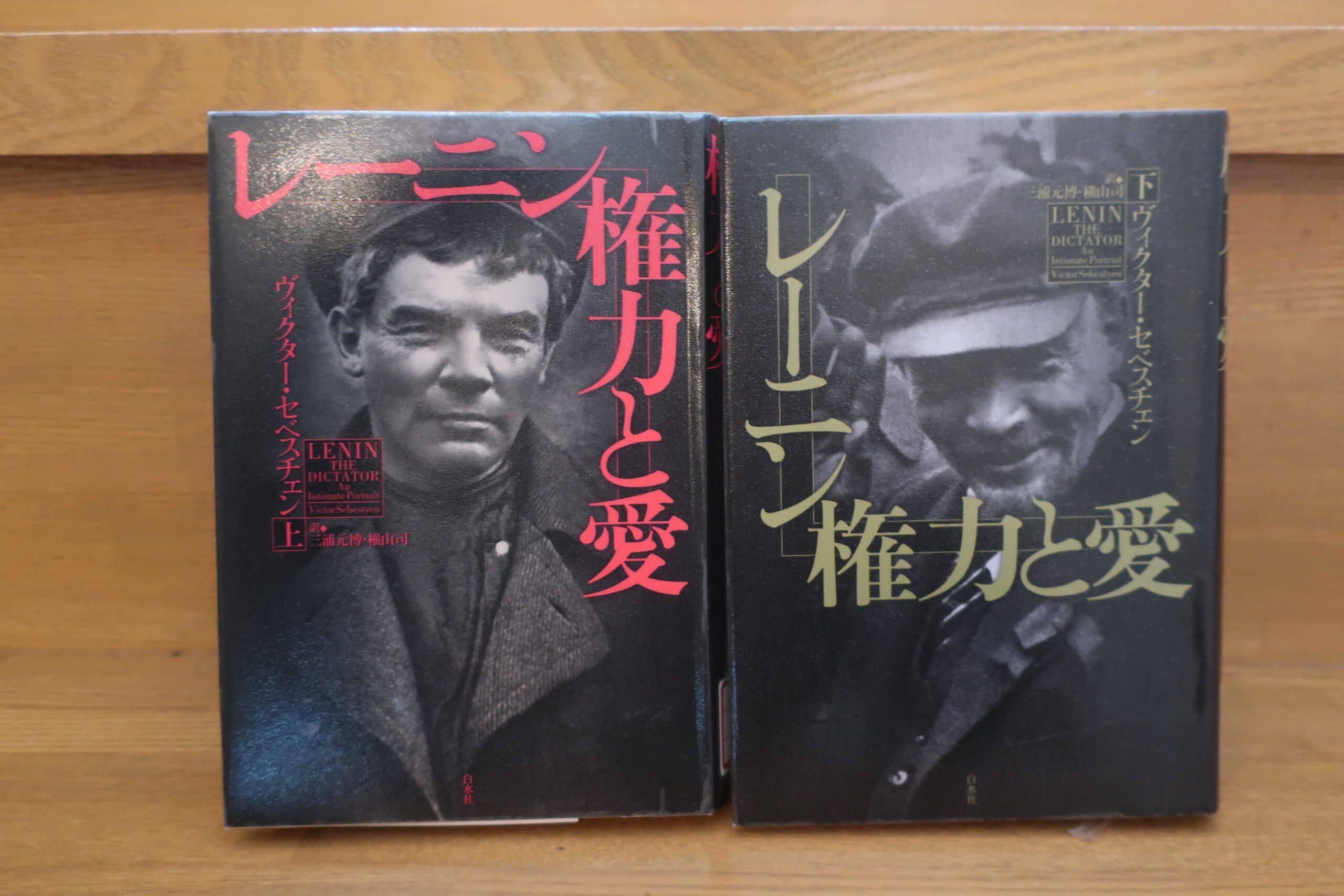Table of Contents
Read Victor Sebeschen's Lenin, Power and Love⑽.
Continued by Victor SebeschenLenin, Power and Love.The following are some of the memorable passages from the
The Russian October Revolution and Lenin's Seizure of Power
With the fall of the Romanov dynasty in the Russian February Revolution of February 1917, the national government was led by a provisional government. The Bolshevik Party led by Lenin was only one of the opposition parties and was not yet in power.
However, the temporary government did not operate well, and public dissatisfaction built up. In the meantime, as I mentioned in my previous article, Lenin, with the help of overwhelming funds from Germany, gained control of the newspaper network and gained the support of the people.
Finally, in October of the same year, Lenin made his move. With the military on their side, the Bolsheviks staged a coup d'etat. After a constitutional assembly, Lenin finally seized power.

The Russian Revolution is complicated by the fact that the February Revolution and the October Revolution were completely different in nature. The February Revolution was a spontaneous outbreak of dissatisfaction with the Romanov dynasty, while the October Revolution was a coup d'etat to seize power from Lenin. I have only given you a brief outline of the history of the October Revolution, but I hope you will read this book to learn more about it.
Lenin's obsession
After October 25, 1917, when he illegitimately assumed power, Lenin's only real concern throughout the rest of his life was to maintain it - an obsession that he passed on to his successors. Throughout its entire existence, the USSR identified itself with the founder of the state, dead or alive.
The regime Lenin founded was largely shaped by his personality. It was a personality that was secretive, suspicious, illiberal, ascetic, and radical. The more favorable aspects of Lenin's personality hardly left a trace in the public sphere of the Soviet Union.
Hakusuisha, Victor Sebeschen, translated by Motohiro Miura and Tsukasa Yokoyama, Lenin: Power and Love, vol. 2, p126
Some line breaks have been made.
Having achieved his long-cherished dream of seizing power, Lenin now became obsessed with maintaining it. This became an obsession that greatly affected the character of the Soviet system.
What was "power" for Lenin?
Throughout his life as a revolutionary, Lenin was devoted to the study of one subject in particular. Lenin was devoted to the study of one subject in particular: the nature of power, how to obtain and exercise it, and how it transforms those who possess it and those who do not.
He wanted power per se, as any egoist would. But he sincerely believed that he was trying to use it to improve the lives of the multitude of the people.
Thus he justified the falsehoods, deceptions, and terror that followed. Everything was acceptable in the pursuit of the socialist dream. Angelika Barabanova, who respected and admired him but came to fear and loathe him, says that Lenin's "tragedy, to use Goethe's phrase, is that he created ...... evil in the hope of good.Faust."Mephistopheles said, "Always desire evil, always do good."]
Hakusuisha, Victor Sebeschen, translated by Motohiro Miura and Tsukasa Yokoyama, Lenin: Power and Love, vol. 2, p126-127
Some line breaks have been made.
Lenin himself, the author states, sincerely believed that he was "trying to exercise it to improve the lives of the multitude of the people." The phrase, "The tragedy, to use Goethe's phrase, is that we have created ...... evil in the hope of good," is also significant.
Lenin was not interested in the veneer of power and did not enjoy it. His goal was to impose his ideas and personality on others, to bend them to his will. He disliked showmanship, and he and Nadja (Lenin's wife. He lived a simple life with Nadja (Lenin's wife, blog author's note) in a monotonous middle-class civilian style.
Gorky once commented that this frugality in such an autocratic figure was an example of Lenin's "narcissism." Martov thought likewise. At the same time, however, he often said that "Lenin has no vanity"-a paradox not often seen in those in power.
Lenin's desire for power was not for luxury, money, or sex. It is known that Inessa was his only romantic interest outside of marriage. He tasted the pleasures of power, but he did not taste the pleasures of violence himself. He was not a sadist.
Lenin did not wear anything resembling a military uniform, as so many dictators prefer. He usually wore a tired suit and tie. He knew that the Bolsheviks would use terror, but he always justified and condoned it as necessary. However, he was never present at executions and had no interest in hearing about them. He saw only three dead bodies in his life. His father, his sister Olga, and his mother-in-law. For Lenin, the blood he was willing to shed was largely theoretical.
Hakusuisha, Victor Sebeschen, translated by Motohiro Miura and Tsukasa Yokoyama, Lenin: Power and Love, vol. 2, p127-128
Some line breaks have been made.
Lenin was not interested in the pretense of power. This is a very interesting fact for us. He operated on a completely different principle of thought than the average philistine.
And as I mentioned at the end of the quote, I think it is a significant fact that he himself never witnessed the executions or even saw the bodies. He did not see the suffering of the tortured human beings, the blood that was absurdly killed and spilled. All his violence is merely theoretical.
This is Dostoevsky'sCrime and Punishment."It is reminiscent of the thought of Raskolnikov, the protagonist of The overwhelming genius is allowed to do whatever he wants. I felt a similarity with the thought that Raskolnikov, who pushed reason to the limit, ended up with. However, while Raskolnikov went into a frenzy after committing murder, Lenin did not dirty his hands, and I am not sure if he really thought in the same principle as Raskolnikov. However, the next time I read "Crime and Punishment," I would like to read it with Lenin in mind.
No one expected the Bolsheviks to survive.
No one in Petrograd thought the Bolsheviks would survive long. According to journalists from one liberal newspaper, it was "a government of journalists and pamphleteers" that did not know how to run an administration at all.
Another newspaper the morning after the coup described the Bolsheviks in a witty headline as "the caliphs of an hour." The leading Menshevik, Tsereteli, branded them as three days at most.
Gorky had taken to the streets the day before to watch the revolution with a somber mood, and he said that Lenin had two weeks at most. He said that Lenin had two weeks at the most.
Although Vladimir Nabokov lost his job when the Provisional Government was overthrown, he was not arrested like the ministers he had served. He "refused to believe for one minute in the strength of the Bolshevik regime and anticipated its ...... early extinction."
Zinaida Gippius says, "This government by a group of fraudsters cannot survive for long."
Several foreign embassies have also reported the same urgently to their home governments. An advisor to the British ambassador to the United Kingdom telegraphed the Foreign Ministry within days, telling them that "there is no question that the Bolshevik regime is already on the verge of bankruptcy.
Having informed the State Department that there would be no Bolshevik coup, the U.S. ambassador now called the seizure of power a "scandalous thing" and assured Washington that the Bolsheviks would be ousted without question.
Hakusuisha, Victor Sebeschen, translated by Motohiro Miura and Tsukasa Yokoyama, Lenin: Power and Love, vol. 2, p128
Some line breaks have been made.
The fact that no one at the time imagined that the Bolshevik regime established by coup d'état would survive for so long is somewhat reminiscent of the establishment of the Nazi regime of Hitler.
It is said that the German people never imagined that Hitler would have so much power.
The scary thing about history is that we never expect it to happen." And there is a danger that it will repeat itself in different forms. We are no strangers to this.
Creation of the "Chekaa", a key element of the future KGB - the national police force, of which President Putin was a member.
A secret proclamation written by Lenin created the "Chekar," the mainstay of the Soviet police state. In the years that followed, the name changed many times.National Political Security Service→directional marker or indicatorJoint State Political Security Service→directional marker or indicatorCommittee of the People's Commission for Home Affairs→directional marker or indicatorNational Security Council (USA)And finally, the most well-known figure,National Security Council (USA)(KGB).
Whatever the name, its mission remained the same. The mission remained the same: to protect the party and its leadership from any perceived threat of overthrow and to enforce "revolutionary justice.
In Lenin's words, it was "the sword and shield of the party," and these two images formed its emblem.
Until its dismantling in the 1990s, most agents called themselves "Chekists. Vladimir Putin, president of Russia 100 years after the revolution and a longtime KGB officer until the collapse of the Soviet Union, used to say he was a Chekist. The same is true of the thousands of employees who worked in the Stasi in East Germany and the Securitate in Romania - similar institutions that the Chekars spawned widely throughout the communist world.
The Chekaa was founded on December 7, 1917 as an "emergency committee" (Cirezvicha Commissariat) to fight counter-revolution, speculation, and profligacy. Officially, it was to work in cooperation with another committee created three days earlier to fight "wine pogroms" - vandalism of wine cellars of czars and wealthy people who had been arrested or had escaped Petrograd. Any attempt to break into wine cellars, spirits cellars, warehouses, stores, or private residences would be crushed by machine gun fire without warning. Chequer's authority, however, was always intended to be expanded.
In Lenin's words, Cheker's job was to "investigate and clean up all attempts and acts related to counterrevolution or negligence throughout Russia, no matter who was responsible for them.
But its functions and powers were not made public until the mid-1920s, and from the beginning it operated outside the framework of the law according to secret procedures, with virtually no political accountability. The Soviets had no supervisory authority, and for years neither did the Congress of People's Commissars. The Cheker was accountable only to Lenin.
Soon the Chekaa became the most feared of the various state "agencies" and its head the most hated man in Russia. Lenin said that the Cheker needed to put a "loyal proletarian Jacobin" in charge.
Hakusuisha, Victor Sebeschen, translated by Motohiro Miura and Tsukasa Yokoyama, Lenin: Power and Love, vol. 2, p154-155
Some line breaks have been made.
Once Lenin seized power, he immediately created the secret police to protect it. This organization was modeled after the Oblana, the secret police under the direct control of the Russian tsar, and its purpose was to detect and arrest resistance elements as quickly as possible. Later, however, the Chekaa became far more brutal than the Oblana.
We have described the repression by the chequers in a previous article, which you may also refer to here.
The famous KGB was also based on this cheker. President Vladimir Putin was once a member of this organization and called himself a Chekist. Considering what the Chequers have done, this seems like an incredibly frightening declaration...
be unbroken
Next Article.
Click here to read the previous article.
Click here for a list of "Reading Biography of Lenin" articles. There are 16 articles in total.
Related Articles





































